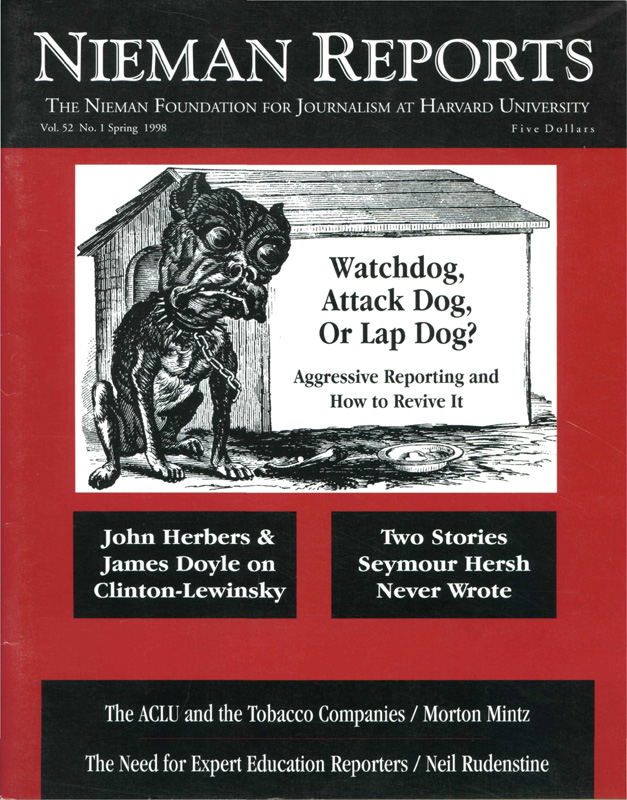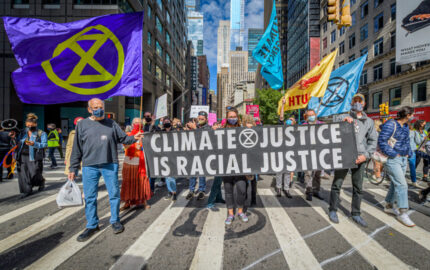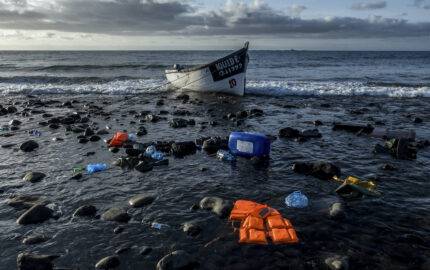Richard Parker's paper is an insightful, scholarly and valuable overview. But his analysis of contemporary watchdog economics journalism and his recommendations trouble this long-time reporter.
Consider these quotes: "It seems malign" to insist "that we suffer from too little information about economics and business conduct." "[M]ight it be time for watchdog economic reporting's advocates to expand some of its traditional focus.. .to investigating the audience for such reporting?" If watchdog reporting is to nurture a democratic society, there must be "a shift in [its] focus—from the documentation of what troubles Americans, to asking them to weigh solutions...."
These statements seem to me to boil down to this: Watchdog economics reporting is too confined in scope and should embrace some kind of sophisticated polling and politicking.
The principal mainstream media corporations, it must always be remembered, are themselves big business, are financially dependent upon it, and have extremely close ties to it. Their outside directors come overwhelmingly from big business (including law and accounting firms); none I know of is an independent professional journalist, a consumer advocate or a rank-and-file citizen. Always allowing for courageous exceptions, they shortchange the citizenry—the supposed sovereign—by providing too much establishment and too little nonestablishment reporting and commentary on either economics or business conduct.
Tobacco aside, news coverage of corporate crime and misconduct is generally wafer-thin. Editorials and columns rarely address it. In the papers I read—The Washington Post, The New York Times and The Wall Street Journal—I can't recall a single editorial holding a corporate executive personally accountable for death-dealing or environment-destroying misbehavior, or a Journal editorial acknowledging that it exists. Many journalists shun this area.
Their perception of it as a career-derailer was fortified in March 1997, when The San Francisco Examiner killed a Stephanie Salter column critical of Nike, a co-sponsor of the paper's promotional "Bay to Breakers" race, and again in February, when CBS news executives publicly savaged "48 Hours" reporter Roberta Baskin for criticizing CBS's flackery for the same athletic-goods maker, a sponsor of CBS's Winter Olympics coverage.
Is it "malign" to insist that Americans "suffer from too little information about economics"?
When the momentous NAFTA and GATT bills were pending in Congress, the news coverage and commentary in the big four newspapers—The Times, Post, Journal and Los Angeles Times— all tilted heavily toward approval. In the case of the GATT treaty, none of those papers, unlike The Boston Globe, undertook independent investigations; meanwhile, they nearly or totally ignored numerous other newsworthy developments, including:
For eight years. President Reagan's Task Force on Deregulation initiated severe cutbacks of federal regulation against hazards in the marketplace and workplace. Task Force chairman George Bush often boasted of its achievements. Yet up to the moment of his election as President in 1988, no major news organization investigated the pluses and minuses. Public Citizen, founded by Ralph Nader, did, and a few weeks before election day released a 52-page report at a news conference. The report said in part: At least 40,000 deaths and one million injuries can be traced to the [Reagan-Bush| Administration's delay in requiring air bags and automatic safety belts in cars. Hundreds of thousands of infants were fed nutritionally deficient infant formula while Bush and the Office of Management and Budget delayed rules requiring testing of infant formula.
No reporter from The New York Times, The Wall Street Journal or The Washington Post attended the news conference; none of these papers carried a story about it.
The savings and loan debacle occurred during the Bush-led waron regulation. Yet during the eight years of his Presidency the press did not ask him a glaringly obvious question: Did deregulation contribute to the S&L disaster?
Meanwhile, the mainstream media— Thejournal's editorial and op-ed pages, in particular—devoted immense attention to the-market-is-God denouncers of regulation; but they made negligible efforts to recall the horrors that had brought us regulation, particularly of food and drugs, in the first place, or to explain that regulation, while always deficient and needing press monitoring, may have redemptive virtues.
Reporters who have the opportunities to do so seem almost never to ask Federal candidates and government leaders countless obvious economics-related questions that bear heavily on people's lives. For examples, should Congress:
Are you concerned by:
And:
Parker implies that the press covers business conduct adequately.
Well, we all know that a responsible press has a solemn obligation to monitor governance by all institutions empowered to determine whether we live or die, whether we are harmed or unharmed, whether the environment is damaged. This thesis was dramatically verified in an exchange of letters about 70 years ago by two ultimate insiders, Alfred P. Sloanjr., President of General Motors, and LammotDuPont, President of E.I. DuPont deNemours.
At the time, Fords had had safety-glass windshields; Chevrolet windshields were flat glass, which shatters on impact into slashing, even lethal shards. For sound business reasons— his company made pyralin, the key component of safety glass—Lammot DuPont urged Sloan to use safety glass in Chevrolets; Sloan refused, also for sound business reasons.
"Accidents or no accidents, my concern in this problem is a matter of profit and loss," Sloan wrote DuPont. Ford's use of safety glass is "no reason why we should do so," he continued. "I am trying to protect the interest of the stockholders of General Motors and the corporation's operating position— it is not my responsibility to sell safety glass.... You can say, perhaps, that I am selfish, but business is selfish. We are not a charitable institution—we are trying to make a profit for our stockholders."
The safety-glass case illustrates how a corporation governs directly by making a needlessly dangerous product or operating a needlessly hazardous workplace. Think of the Ford Pintos and Chevrolet Blazer pickups that became rolling human incinerators when their cosmetically shielded fuel tanks were rammed; of A.H. Robins Co.'s defective Dalkon Shield IUD, which rendered tens if not hundreds of thousands of women sterile; of Bhopal, India, where a gas leak from a Union Carbide plant left 2,000 to 5,000 people dead, at least 30,000 to 40,000 seriously hurt and up to 200,000 harmed. But, as do other nongovernment institutions of governance, a corporation also governs indirectly by investing in politicians so as to govern the government.
In this regard, a recent Associated Press story should have been, but certainly wasn't, front-paged everywhere. The Atlantic Richfield oil company, which has continuing large stakes in all sorts of legislation, paid for a week-long trip to England for a four-person entourage led by the Speaker of the House. The bill included $20,268 for air and ground transportation for Newt and Mrs. Gingrich, $12,225 for the couple's five days at Claridge's in London and $947 for meals at the hotel. For two aides the transportation came to $3,300 and hotel rooms to $5,000.
Who doubts that Atlantic Richfield expects to, and likely will, reap enormous taxpayer-funded dividends from its investment of approximately $42,000?
Parker asks:
No. If such a time never comes it will be fine with me.
Parker also asks:
No. The traditional focus is as correct today as ever, if not more so, partly because of the heightened perils of advanced technology, such as nuclear power. It's encouraging that The New York Times has in recent years vigorously implemented the "traditional focus" on corporate misconduct, as demonstrated by its aggressive, sustained coverage of massive fraud by the world's largest hospital company, Columbia/ HCA Healthcare Corp. But it's dismaying that The Washington Post has for years headed in the opposite direction. One need only note that it routinely shrinks news of grave corporate misconduct and buries it in business section "Digest" items. Examples:
Would Parker argue that the "audience" is not interested in such news?
The shift in focus Parker proposes, if justifiable at all, might be warranted when William Allen White's dream—"I suppose in the end newspapers cannot be free, absolutely free in the highest and best sense, until the whole social and economic structure of American life is open to the free interplay of democratic process"—becomes reality.
Don't hold your breath.
Consider these quotes: "It seems malign" to insist "that we suffer from too little information about economics and business conduct." "[M]ight it be time for watchdog economic reporting's advocates to expand some of its traditional focus.. .to investigating the audience for such reporting?" If watchdog reporting is to nurture a democratic society, there must be "a shift in [its] focus—from the documentation of what troubles Americans, to asking them to weigh solutions...."
These statements seem to me to boil down to this: Watchdog economics reporting is too confined in scope and should embrace some kind of sophisticated polling and politicking.
The principal mainstream media corporations, it must always be remembered, are themselves big business, are financially dependent upon it, and have extremely close ties to it. Their outside directors come overwhelmingly from big business (including law and accounting firms); none I know of is an independent professional journalist, a consumer advocate or a rank-and-file citizen. Always allowing for courageous exceptions, they shortchange the citizenry—the supposed sovereign—by providing too much establishment and too little nonestablishment reporting and commentary on either economics or business conduct.
Tobacco aside, news coverage of corporate crime and misconduct is generally wafer-thin. Editorials and columns rarely address it. In the papers I read—The Washington Post, The New York Times and The Wall Street Journal—I can't recall a single editorial holding a corporate executive personally accountable for death-dealing or environment-destroying misbehavior, or a Journal editorial acknowledging that it exists. Many journalists shun this area.
Their perception of it as a career-derailer was fortified in March 1997, when The San Francisco Examiner killed a Stephanie Salter column critical of Nike, a co-sponsor of the paper's promotional "Bay to Breakers" race, and again in February, when CBS news executives publicly savaged "48 Hours" reporter Roberta Baskin for criticizing CBS's flackery for the same athletic-goods maker, a sponsor of CBS's Winter Olympics coverage.
Is it "malign" to insist that Americans "suffer from too little information about economics"?
When the momentous NAFTA and GATT bills were pending in Congress, the news coverage and commentary in the big four newspapers—The Times, Post, Journal and Los Angeles Times— all tilted heavily toward approval. In the case of the GATT treaty, none of those papers, unlike The Boston Globe, undertook independent investigations; meanwhile, they nearly or totally ignored numerous other newsworthy developments, including:
- A seven-day Senate hearing held in October and November 1994—while other news from Capitol Hill was sparse because Congress was out of session.
- Letters to President Clinton from the attorneys general of 30 states, who warned that secret World Trade Organization tribunals would erode the states's sovereignty, and from leaders of 51 media organizations (!), who protested the secrecy and inaccessibility of WTO deliberations as "an affront to the democratic traditions of this nation."
For eight years. President Reagan's Task Force on Deregulation initiated severe cutbacks of federal regulation against hazards in the marketplace and workplace. Task Force chairman George Bush often boasted of its achievements. Yet up to the moment of his election as President in 1988, no major news organization investigated the pluses and minuses. Public Citizen, founded by Ralph Nader, did, and a few weeks before election day released a 52-page report at a news conference. The report said in part: At least 40,000 deaths and one million injuries can be traced to the [Reagan-Bush| Administration's delay in requiring air bags and automatic safety belts in cars. Hundreds of thousands of infants were fed nutritionally deficient infant formula while Bush and the Office of Management and Budget delayed rules requiring testing of infant formula.
No reporter from The New York Times, The Wall Street Journal or The Washington Post attended the news conference; none of these papers carried a story about it.
The savings and loan debacle occurred during the Bush-led waron regulation. Yet during the eight years of his Presidency the press did not ask him a glaringly obvious question: Did deregulation contribute to the S&L disaster?
Meanwhile, the mainstream media— Thejournal's editorial and op-ed pages, in particular—devoted immense attention to the-market-is-God denouncers of regulation; but they made negligible efforts to recall the horrors that had brought us regulation, particularly of food and drugs, in the first place, or to explain that regulation, while always deficient and needing press monitoring, may have redemptive virtues.
Reporters who have the opportunities to do so seem almost never to ask Federal candidates and government leaders countless obvious economics-related questions that bear heavily on people's lives. For examples, should Congress:
- Cap loans eligible for mortgage-interest deductions, bearing in mind that a $300,000 loan cap would save $34.8 billion 1996 through 2000 (the Congressional Budget Office's estimate) and curb subsidies of the wealthy by, say, renters who can't afford to buy a home?
- Repeal the 1872 law enabling mining companies to buy public lands for $2.50 to $5 an acre, extract minerals worth billions of dollars, and pay nothing to the owners—the American people?
- Require private broadcasters profiting from use of the public's airwaves to give free air time to Federal candidates? (Media lobbies fiercely oppose this.)
Are you concerned by:
- More unequal income distribution, and a wider gap between the pay of chief executive officers and workers, in the United States than in any other advanced country?
- The 13 percent increase in the share of income going to the top-fifth of Americans, and the 22 percent decrease in the share going to the bottom fifth, between 1979 and 1996? (A few media tycoons are billionaires.)
And:
- In 1994 the Food and Drug Administration's proposed tough teen smoking regulations that 124 House Republicans and Democrats protested. Were they influenced by tobacco-industry campaign contributions that, on average, were 69 times larger than those the industry made to the 86 Representatives who pledged to support the regulations?
Parker implies that the press covers business conduct adequately.
Well, we all know that a responsible press has a solemn obligation to monitor governance by all institutions empowered to determine whether we live or die, whether we are harmed or unharmed, whether the environment is damaged. This thesis was dramatically verified in an exchange of letters about 70 years ago by two ultimate insiders, Alfred P. Sloanjr., President of General Motors, and LammotDuPont, President of E.I. DuPont deNemours.
At the time, Fords had had safety-glass windshields; Chevrolet windshields were flat glass, which shatters on impact into slashing, even lethal shards. For sound business reasons— his company made pyralin, the key component of safety glass—Lammot DuPont urged Sloan to use safety glass in Chevrolets; Sloan refused, also for sound business reasons.
"Accidents or no accidents, my concern in this problem is a matter of profit and loss," Sloan wrote DuPont. Ford's use of safety glass is "no reason why we should do so," he continued. "I am trying to protect the interest of the stockholders of General Motors and the corporation's operating position— it is not my responsibility to sell safety glass.... You can say, perhaps, that I am selfish, but business is selfish. We are not a charitable institution—we are trying to make a profit for our stockholders."
The safety-glass case illustrates how a corporation governs directly by making a needlessly dangerous product or operating a needlessly hazardous workplace. Think of the Ford Pintos and Chevrolet Blazer pickups that became rolling human incinerators when their cosmetically shielded fuel tanks were rammed; of A.H. Robins Co.'s defective Dalkon Shield IUD, which rendered tens if not hundreds of thousands of women sterile; of Bhopal, India, where a gas leak from a Union Carbide plant left 2,000 to 5,000 people dead, at least 30,000 to 40,000 seriously hurt and up to 200,000 harmed. But, as do other nongovernment institutions of governance, a corporation also governs indirectly by investing in politicians so as to govern the government.
In this regard, a recent Associated Press story should have been, but certainly wasn't, front-paged everywhere. The Atlantic Richfield oil company, which has continuing large stakes in all sorts of legislation, paid for a week-long trip to England for a four-person entourage led by the Speaker of the House. The bill included $20,268 for air and ground transportation for Newt and Mrs. Gingrich, $12,225 for the couple's five days at Claridge's in London and $947 for meals at the hotel. For two aides the transportation came to $3,300 and hotel rooms to $5,000.
Who doubts that Atlantic Richfield expects to, and likely will, reap enormous taxpayer-funded dividends from its investment of approximately $42,000?
Parker asks:
"[M]ight it be time for watchdog economic reporting...to investigate] the audience for such reporting...?"
No. If such a time never comes it will be fine with me.
Parker also asks:
"Might it be time...to move from documenting what troubles Americans, to asking them to weigh solutions...?'"
No. The traditional focus is as correct today as ever, if not more so, partly because of the heightened perils of advanced technology, such as nuclear power. It's encouraging that The New York Times has in recent years vigorously implemented the "traditional focus" on corporate misconduct, as demonstrated by its aggressive, sustained coverage of massive fraud by the world's largest hospital company, Columbia/ HCA Healthcare Corp. But it's dismaying that The Washington Post has for years headed in the opposite direction. One need only note that it routinely shrinks news of grave corporate misconduct and buries it in business section "Digest" items. Examples:
- The agreement of Laboratory Corp. of America to pay $187 million in civil and criminal penalties to settle charges that it billed Medicare and other Federal programs for unnecessary blood tests.
- The $115 million fine imposed on DuPont for concealing evidence in a Federal trial involving one of its pesticides. DuPont "cheated deliberately, consciously and with purpose," the judge said. The criminal conviction of three C.R. Bard Inc. executives for hiding information about the use of faulty catheters in coronary surgery.
Would Parker argue that the "audience" is not interested in such news?
The shift in focus Parker proposes, if justifiable at all, might be warranted when William Allen White's dream—"I suppose in the end newspapers cannot be free, absolutely free in the highest and best sense, until the whole social and economic structure of American life is open to the free interplay of democratic process"—becomes reality.
Don't hold your breath.



